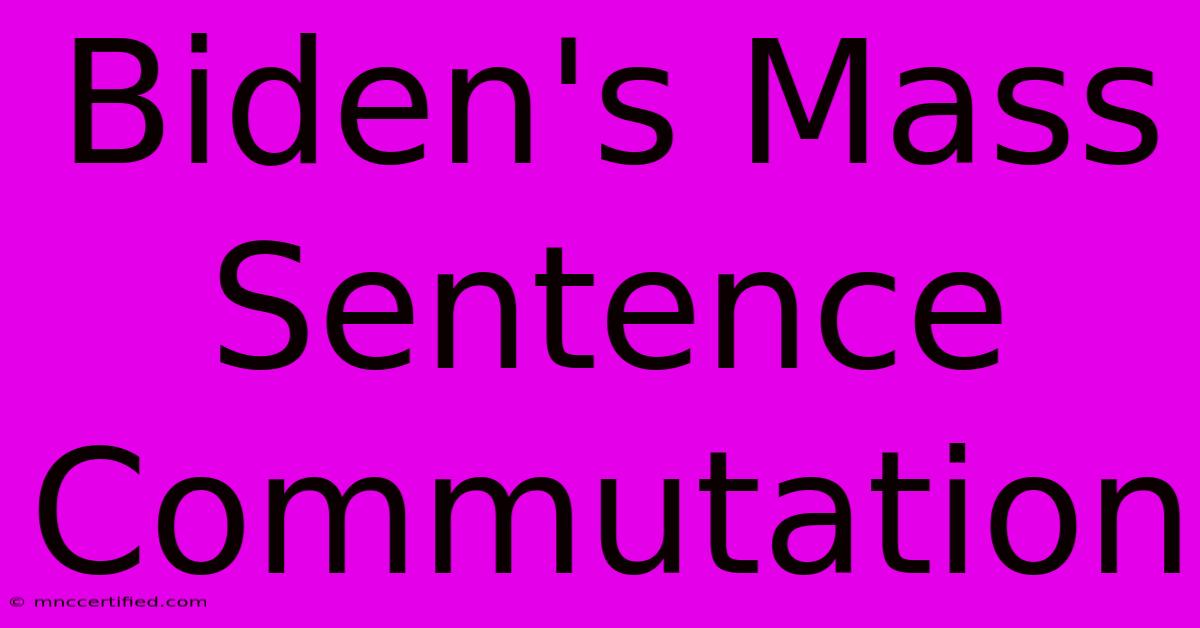Biden's Mass Sentence Commutation

Table of Contents
Biden's Mass Sentence Commutation: A Deep Dive into Clemency and Reform
President Biden's mass sentence commutation, announced on [Insert Date of Announcement], represents a significant step in criminal justice reform. This action, impacting [Number] individuals convicted of non-violent drug offenses, sparked considerable debate and underscores the ongoing conversation surrounding clemency, rehabilitation, and the complexities of the US justice system. This article will explore the details of the commutation, its implications, and the broader context of criminal justice reform efforts.
Understanding the Scope of the Commutation
Biden's commutation targeted individuals serving lengthy sentences for non-violent drug offenses, primarily involving crack cocaine. This reflects a growing recognition of the disproportionate impact of harsh sentencing guidelines on marginalized communities and the need for a more equitable approach to justice. The key criteria for selection likely included:
- Non-violent drug offenses: This emphasizes the administration's focus on reforming sentencing for crimes that don't involve violence or threat of violence.
- Length of sentence: Individuals serving lengthy sentences, potentially disproportionate to the crime, were prioritized.
- Evidence of rehabilitation: Factors such as good behavior in prison, participation in rehabilitation programs, and demonstrated commitment to reform likely played a role in selection.
Key Differences from Past Clemency Initiatives
While past administrations have also engaged in clemency initiatives, Biden's commutation differs in several aspects. [Compare and contrast with previous administrations' approaches – e.g., Obama's clemency initiative]. This comparison highlights the evolving understanding of criminal justice reform and the shifting political landscape surrounding the issue. Consider mentioning specific differences in scale, criteria, or targeted offenses.
The Implications of Biden's Action
The implications of this mass commutation are far-reaching and extend beyond the immediate impact on the individuals involved. These implications include:
- Reduced prison overcrowding: Releasing individuals from prison alleviates strain on the already overburdened correctional system.
- Cost savings: Maintaining incarcerated individuals is expensive. Commutation reduces the financial burden on taxpayers.
- Reintegration into society: Successful reintegration requires support systems and resources. The commutation necessitates a focus on providing opportunities for those released.
- Impact on public opinion: The commutation will inevitably spark public discussion on the effectiveness of harsh drug sentencing, fairness within the justice system, and the role of clemency in addressing past injustices.
Challenges and Criticisms
While the commutation is lauded by many advocates for criminal justice reform, it also faces criticism. Some argue that:
- The number of commutations is insufficient: Critics may argue that the number of individuals impacted is too small compared to the scale of the problem.
- The criteria are too narrow: Some might contend that the focus on non-violent drug offenses excludes other deserving individuals.
- Reintegration support is lacking: Concerns may exist regarding adequate support for released individuals to successfully reintegrate into society and avoid recidivism.
Addressing these criticisms is crucial for a comprehensive understanding of the complexities surrounding this initiative.
The Broader Context of Criminal Justice Reform
Biden's commutation is part of a larger movement towards criminal justice reform in the United States. This movement encompasses various legislative and policy changes aimed at:
- Reducing mass incarceration: This includes efforts to reform sentencing guidelines, reduce mandatory minimum sentences, and address racial disparities in the justice system.
- Investing in rehabilitation and reentry programs: Supporting individuals after release is critical for reducing recidivism.
- Addressing systemic biases: Efforts are underway to identify and mitigate biases within the justice system that disproportionately impact marginalized communities.
Looking Ahead: The Future of Clemency and Reform
President Biden's mass sentence commutation signals a commitment to criminal justice reform, but significant challenges remain. The long-term success of this initiative depends on:
- Sustained political will: Continued support from policymakers is essential for meaningful and lasting reform.
- Effective reentry programs: Robust support systems are crucial for successful reintegration into society and preventing recidivism.
- Ongoing evaluation and adjustment: Regular assessment of the initiative's effectiveness is necessary to make necessary adjustments and optimize its impact.
This ongoing conversation about clemency and reform is vital for creating a more just and equitable criminal justice system. The impact of Biden’s commutation will be closely observed and analyzed in the years to come, shaping future discussions and policies.

Thank you for visiting our website wich cover about Biden's Mass Sentence Commutation. We hope the information provided has been useful to you. Feel free to contact us if you have any questions or need further assistance. See you next time and dont miss to bookmark.
Featured Posts
-
White House Presidential Pardon List
Dec 13, 2024
-
Isaac Guerendo Plays Rams Game
Dec 13, 2024
-
1500 Sentences Commuted By Biden
Dec 13, 2024
-
Metas 1 M Donation To Trump Inaugural
Dec 13, 2024
-
Hojlund Hope For Amorim Amidst Uniteds Struggle
Dec 13, 2024